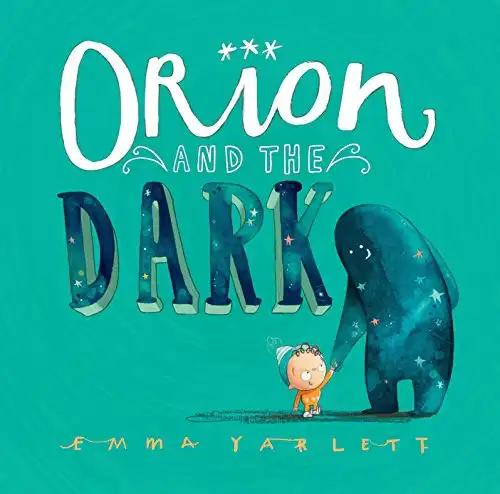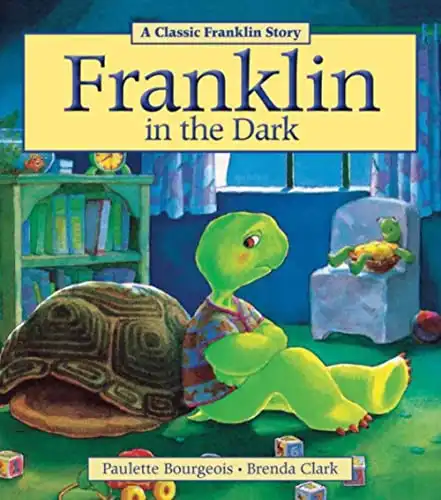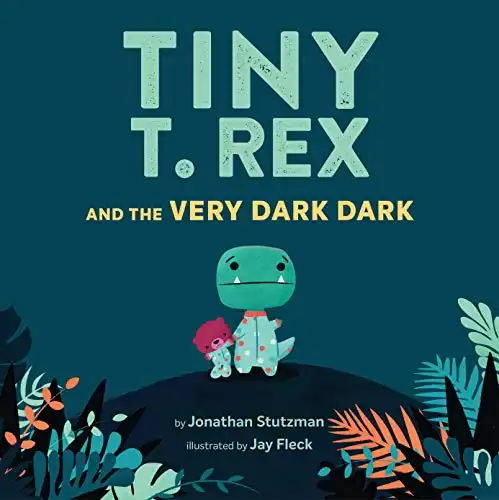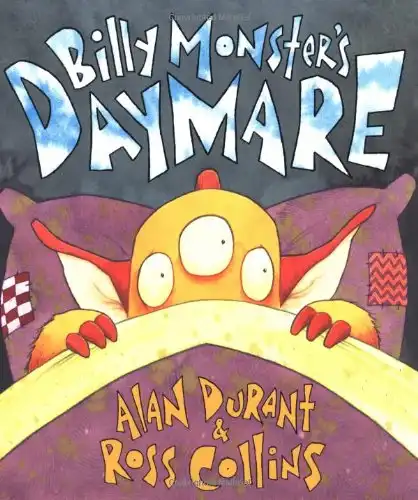Is your toddler afraid of the dark? Do you suspect they might be? Are bedtimes emotional and clingy?
A toddler’s fear of the dark is not a small thing. It needs to be handled correctly so your little one can sleep peacefully once again.
If you want your toddler to overcome this fear and reclaim your evenings, here’s exactly what you must do.
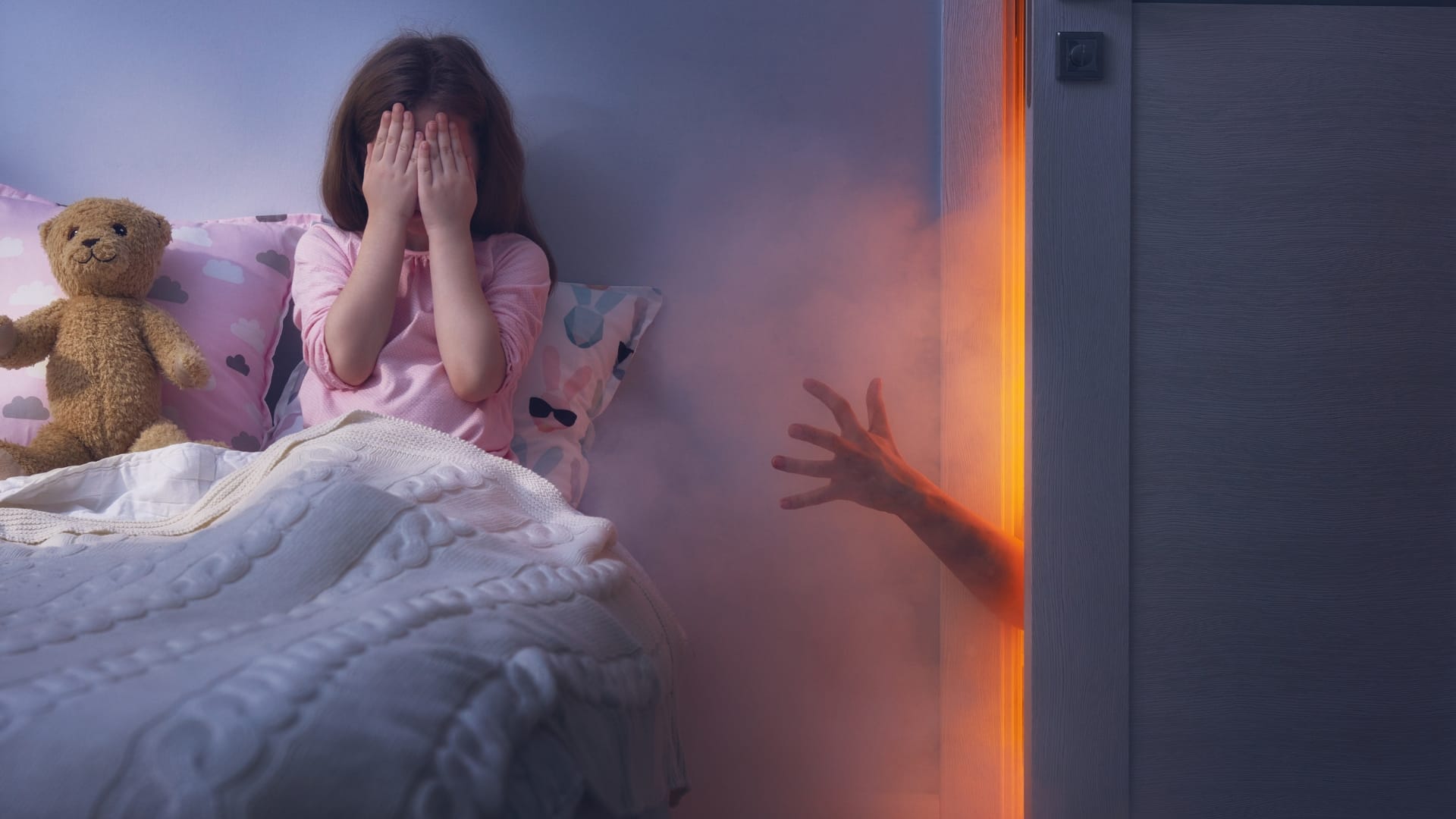
Table of Contents
What Causes A Toddler’s Fear Of The Dark?
A toddler’s fear of the dark is caused by a developing imagination that is confused with reality. Combined with the fact that your toddler’s ability to imagine unknown creatures or dangers can often be amplified in the dark where visual cues are absent… Imagined creatures can seem very real to them in the dark corners and under beds when the lights go out.
At What Age Do Children Become Afraid Of The Dark?
Around the age of 2, toddlers often become afraid of the dark as a result of their powerful imaginations and ability to learn new concepts.
Some children can experience a fear of the dark earlier than this, but it’s not common.
Between the ages of 2 and 6 years old, a fear of the dark is most likely to occur.
Why Do Some Toddlers Suddenly Become Afraid Of The Dark?
Your toddler’s fear of the dark is a common part of their development and usually begins as their imagination becomes more active.
This developmental milestone can make bedtime stories seem very real to them, and the darkness may fill their mind with worry.
However, when this fear occurs suddenly, it is usually because it’s been triggered by a big change that has recently occurred in your toddler’s life. Starting daycare, the arrival of a sibling, or moving house are the major changes that can cause your toddler to become afraid of the dark.
Your toddler can also develop a fear of the dark suddenly by recently experiencing a nightmare or a night terror. To learn more about handling toddler nightmares and night terrors, read these posts:
- Toddler Nightmares: 6 Tricks To Prevent Them From Happening
- Night Terrors In Toddlers: Don’t Panic! Do These 7 Things.
REMEMBER: This type of anxiety in toddlers is not more than just about what they can see; it’s about what they cannot see and what could be lurking in the shadows. This is because their young minds do not fully comprehend the boundaries between reality and make-believe.
Signs Your Toddler Is Developing A Fear Of The Dark
Sometimes your toddler may not be able to vocalise their fear of the dark and it may show itself in indirect behaviours. Signs to watch out for are:
- Clinginess and increased separation anxiety at bedtime
- Delaying tactics in the lead-up to bedtime and in saying goodnight
- Constant requests for not wanting the light turned out or the bedroom door shut
- They wake in the middle of the night screaming and scared
- If an older sibling is afraid of the dark, they may become fearful too without really knowing why
- They start asking questions about the dark and scary monsters in cupboards and under beds, asking you to check that there is nothing there
If your toddler is showing any of these signs they are likely developing a fear of the dark which will need to be addressed with lots of loving care and support.
TOP TIP: Not all young children will be able to vocalize their fear so you might notice that they are more anxious during the day such as struggling to make decisions, suffering from separation anxiety, not wanting to go to daycare or preschool, and struggling with concentration.
How Can You Help A Toddler Afraid Of The Dark?
If your toddler is showing signs of fear of the dark it’s essential to offer loving comfort and support. Here are my top tips for helping toddlers feel safe at night again:
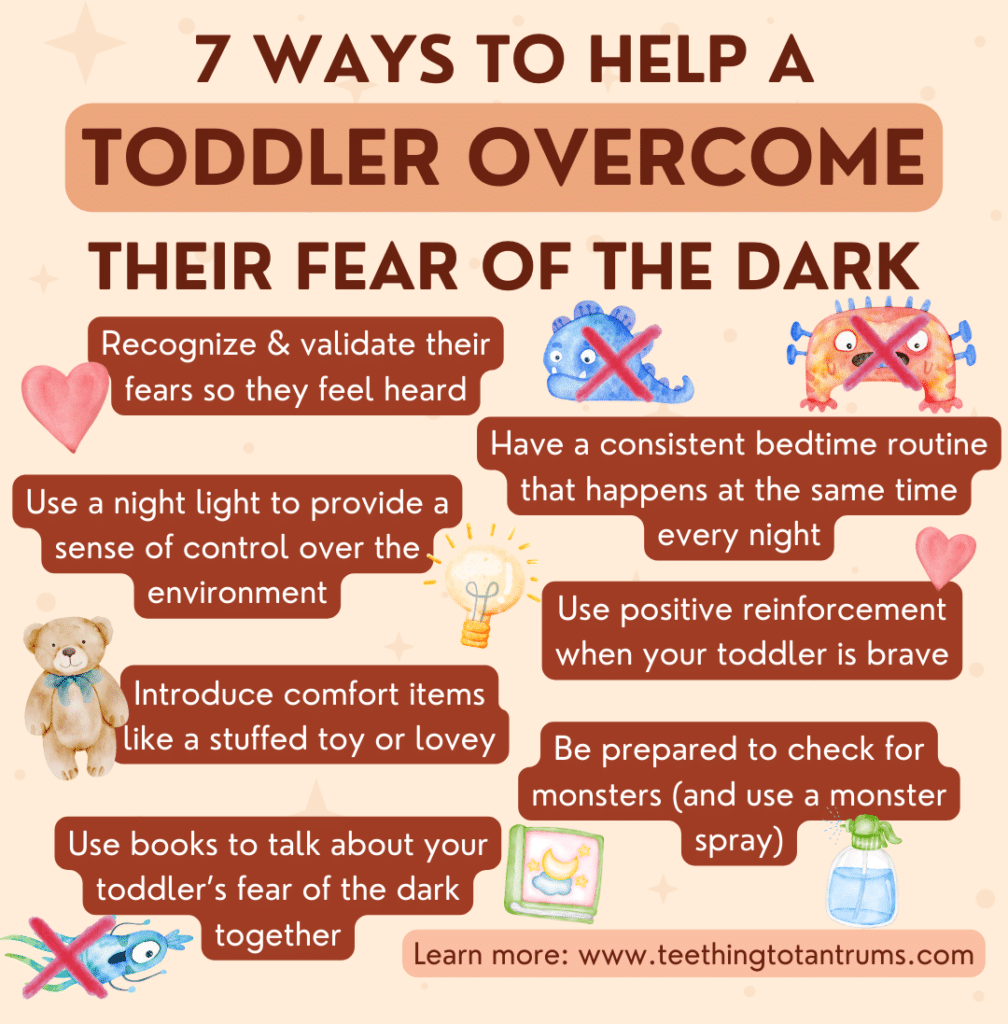
- Recognize and validate their feelings to ensure they feel heard. Never mock or dismiss your toddler’s fear of the dark as this can cause more distress and anxiety. Your understanding will go a long way towards helping your toddler gain confidence and learn how to manage their fears.
- Having a recognizable and consistent bedtime routine. A predictable routine will help create a sense of safety that your toddler can find comfort in in the lead-up to bedtime and lights out. The bedtime routine should happen at the same time every night, even on weekends.
- Using a night light can provide a sense of control over the environment and alleviate some of your toddler’s fear of the dark. I particularly like this night light projector.
- Positive reinforcement for bravery can encourage nighttime fear coping skills. Praise your toddler’s efforts to stay calm and offer cuddles to reinforce comfort.
- Introduce comfort items like a favorite stuffed toy, to help your toddler self-soothe. These items can become reliable companions in the night, aiding in overcoming their fear of the dark.
- Be prepared to check for monsters to assure your toddler that no scary beasts are lurking in the dark. Especially under beds, in cupboards, and behind doors. Creating a monster spray by filling a spray bottle with water, sequins and a few drops of essential oils (lavender and camomile work well as they’re relaxing scents) can help with the illusion. You can even get your toddler to decorate the bottle so it’s extra potent!
- Use books to talk about your toddler’s fear of the dark and monsters under the bed with relatable characters that they can identify with who are experiencing the same fear as them. Here are some of my favorites:
|
Primary Rating:
5.0
|
Primary Rating:
4.6
|
Primary Rating:
4.8
|
Primary Rating:
4.6
|
|
Description: Join Orion on an imaginative adventure through the world of the dark! In this beautifully illustrated children's book, author Emma Yarlett explores the concept of fear and how we can overcome it. Follow Orion as he learns to face his fears and discovers the magic and wonder that can be found in the dark. With engaging storytelling and stunning illustrations, "Orion and the Dark" is a must-read for children and parents alike. |
Description: I love Franklin stories and this book is no exception. In this story, poor little Franklin discovers he's afraid of the dark. This is particularly distressing for Franklin as he happens to be a turtle, and the darkness he fears is, of course, inside his own shell. Bravely, with shell in tow, he sets forth to seek help and in the course of his travels discovers a bird who is afraid of heights, a polar bear who is afraid of the cold, and even a hydrophobic duck. In the end, Franklin discovers that everybody is afraid of something, even his own mother, and his response to what he has learned is guaranteed to draw a smile. |
Description: Tiny T-Rex and the Very Dark Dark is a delightful and relatable book that helps children overcome their fear of the dark. Through the lovable character of Tiny T-Rex, children will learn that even the bravest of us can feel scared sometimes and that it's okay to ask for help! With its charming illustrations and empowering message, Tiny T-Rex and the Very Dark Dark is a must-read for any toddler who needs a little extra courage at bedtime. |
Description: Billy Monster's Daymare by Alan Durant is a fantastic children's book that addresses the common fear of the dark uniquely and playfully. The story centers around Billy, a young monster who fears the daylight in the same way that human children might fear the dark. Billy's anxiety about the day is presented in a manner that is relatable to toddlers who have nighttime fears. Through engaging illustrations and a comforting narrative, the book helps children understand that their fears are normal and can be overcome! |
Join Orion on an imaginative adventure through the world of the dark! In this beautifully illustrated children's book, author Emma Yarlett explores the concept of fear and how we can overcome it. Follow Orion as he learns to face his fears and discovers the magic and wonder that can be found in the dark. With engaging storytelling and stunning illustrations, "Orion and the Dark" is a must-read for children and parents alike.
I love Franklin stories and this book is no exception. In this story, poor little Franklin discovers he's afraid of the dark.
This is particularly distressing for Franklin as he happens to be a turtle, and the darkness he fears is, of course, inside his own shell. Bravely, with shell in tow, he sets forth to seek help and in the course of his travels discovers a bird who is afraid of heights, a polar bear who is afraid of the cold, and even a hydrophobic duck. In the end, Franklin discovers that everybody is afraid of something, even his own mother, and his response to what he has learned is guaranteed to draw a smile.
Tiny T-Rex and the Very Dark Dark is a delightful and relatable book that helps children overcome their fear of the dark. Through the lovable character of Tiny T-Rex, children will learn that even the bravest of us can feel scared sometimes and that it's okay to ask for help! With its charming illustrations and empowering message, Tiny T-Rex and the Very Dark Dark is a must-read for any toddler who needs a little extra courage at bedtime.
Billy Monster's Daymare by Alan Durant is a fantastic children's book that addresses the common fear of the dark uniquely and playfully.
The story centers around Billy, a young monster who fears the daylight in the same way that human children might fear the dark. Billy's anxiety about the day is presented in a manner that is relatable to toddlers who have nighttime fears. Through engaging illustrations and a comforting narrative, the book helps children understand that their fears are normal and can be overcome!
Helping An Older Child Who Is Afraid Of The Dark
While the age at which toddlers usually first start to exhibit fear of the dark is normally around 2 years of age… older children who have previously not been afraid of the dark may develop a fear at a later stage.
However, the age of your child will determine how you handle the fear. Here’s what to do:
Helping A 3-Year-Old Who Is Afraid Of The Dark
At 3 years old, a child’s fears can become very vivid. They have a more developed vocabulary and will explain to you how they are feeling and what they are scared of.
Fortunately, this explanation can help in dealing with the fear of the dark better as you can be more specific with your child:
- Acknowledge their feelings to help validate their experiences.
- Never dismiss their fears. Provide support and understanding without dismissing their fears as trivial.
- Use books and storytelling that frame the dark as an adventure or a place where friendly creatures reside.
- Maintain a positive, calming, and consistent bedtime routine. Remember that consistency and loving reassurance are key in instilling a sense of normalcy around nighttime and the evening routine.
Helping A 4-Year-Old Who Is Afraid Of The Dark
With a 4-year-old who becomes scared of the dark, being proactive in combating their fear can help.
Let your 4-year-old choose a special nightlight or even a ceiling projector for their room, to let them have control of the darkness.
You can also engage them in making a monster spray as I mentioned earlier. I have found this a very effective way of helping children of this age combat their fear.
Allow your little one to choose the bottle and what goes into the spray and allow them to spray all the dark corners of the room, under the bed, inside the cupboards, etc to keep the monsters away.
It is important to use lots of positive reinforcement to encourage courage at night and praise your 4-year-old for overcoming their fears.
As with the other age groups offering comfort items, like a favorite stuffed animal, can also soothe them at bedtime and alleviate their fear of the dark.
Use books to help them understand they are not alone in their fear and talk to them during the day about their fears so that bedtime is not the main focus for these discussions.
TOP TIP: Avoid scary TV shows that might promote your child’s fears and imagination. Even just having them on in the background can affect them! (I made this mistake with my son!)
Helping A 5-Year-Old Who Is Afraid Of The Dark
By the time your child is five years old, you may notice that they express their fear of the dark through anger or frustration as well as becoming visibly upset.
Despite this, it is still important to continue to be patient and understanding.
A plan that includes gradually dimming the lights over time might help them adjust to the dark more comfortably, but I would not force this.
Continue to use a night light, the monster spray and talk about their fear of the dark during daylight hours.
I was once told a very successful story by a close friend about combating fear of the dark for 5-year-olds … where her son used a magic toy sword that he kept under his bed to protect him from any monsters.
He never had to use it but just having it under his bed made him feel more secure.
If, despite all your best efforts, your child’s fear of the dark persists and is disrupting their ability to sleep, then consider a visit to the pediatrician to rule out any underlying issues.
Encouraging your child to seek help when they have a problem is a great life lesson and this is just another part of growing up and learning how to face various challenges.
Looking to get your little one to sleep quickly and effortlessly? Check out my Bedtime and Nap Cheat Sheet and master the art of making daytime naps and bedtimes as seamless as possible.
A bedtime & nap cheat sheet so good your little one will ask you to put them to bed...
Laura Williams "This is a life saver! I'm so glad I downloaded your bedtime & nap cheat sheet. My little one actually asked me to put him to bed last night! Unbelievable! Thank you so much!"
Click Here For The FREE Cheat Sheet
When Does A Fear Of The Dark Typically Start And End?
The onset of fear of the dark usually emerges in children around 2 years old. It can persist through the preschool years up to age 6.
But, to be honest, I have known children up to the age of 12 who have fears of the dark and want a light left on in the corridor or the bedroom door open.
This is completely normal too.
No matter how and when it occurs you will need to remain patient and supportive. Fears (no matter whether they’re real or imagined) are scary and can cause your child a great deal of stress.
Can You Prevent A Fear Of The Dark?
A toddler’s fear of the dark is often a natural phase, tied to their active imagination making it very hard to prevent.
And while you cannot categorically prevent your little one from developing a fear of the dark… there are lots of things you can do to help your child through this tricky phase:
- Stick with a comforting and calming bedtime routine
- Use audiobooks, music, ceiling projectors, and night lights
- Never dismiss their fears but rather validate them
- Introduce coping strategies such as making a monster spray
- Use storybooks that address fears of the dark
- Talk about their fear during the daylight hours
- Provide comfort items such as a favorite soft toy or blanket
- Avoiding scary TV shows, stories, or conversations can also reduce fear triggers.
- Consider seeking advice from a counselor if the fear persists or intensifies, as they can offer targeted strategies for prevention and coping.
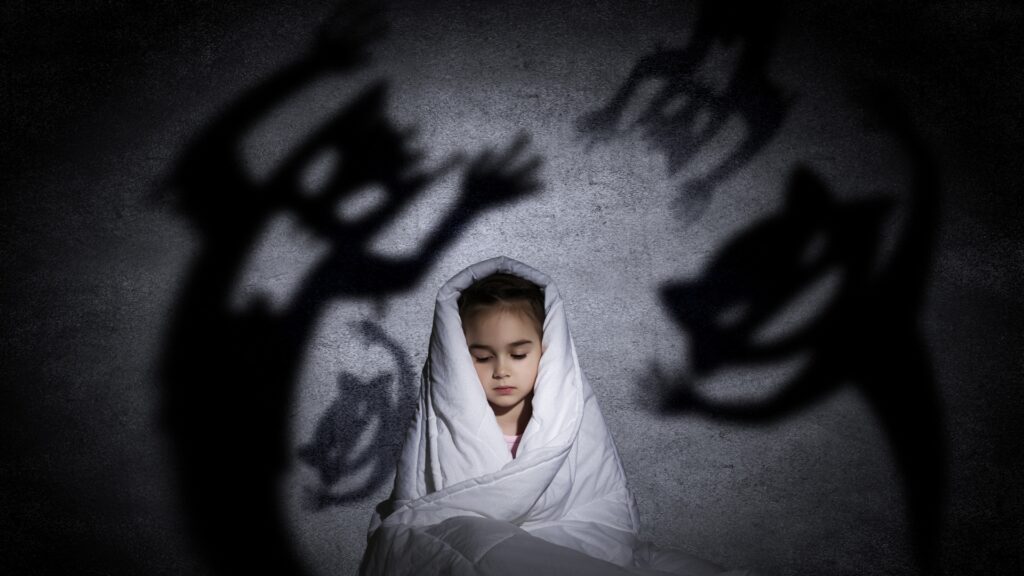
Frequently Asked Questions About Toddlers Who Are Afraid Of The Dark
This section addresses some of the most common inquiries about toddlers and their fear of the dark.
Q: What are common signs that a toddler is afraid of the dark?
A: The most common signs your toddler is afraid of the dark include becoming more anxious as bedtime approaches, crying, clinging to you, or completely avoiding their bedroom when the lights are turned off. Some toddlers express their fear through actions, like attempting to turn the lights back on or asking for someone to stay with them. These behaviors are typical indicators that your toddler might be struggling with a fear of the dark.
Q: Is it normal for toddlers to be afraid of the dark?
A: Yes, it is very normal for toddlers to be afraid of the dark. Rest assured that with time and proper support, this fear typically diminishes. Helping your child feel secure during the night and understanding their fear can assist them in overcoming their fear of the dark gradually.
Q: Are night lights beneficial for toddlers who are scared of the dark?
A: Yes, night lights can be a helpful tool for toddlers who are scared of the dark. They provide a soft illumination that can reduce anxiety by allowing toddlers to see their surroundings. Having a small source of light can give your toddler the comfort they need to fall asleep more peacefully. Here is my favorite nightlight at the moment:
Finding the right night light for your child can be quite a task. You want something safe, comforting, and practical. The Cozy Starry Night Light ticks these boxes, with eye-friendly warm lighting and an easy-to-use dimmer.
Its gentle glow makes it the best night light for feeding baby, diaper changes, or comforting your little one back to sleep.
As your baby grows the Cozy Starry Night Light's starry sky projection can provide comfort and gentle quiet time stimulation. Its soft lighting ensures a dreamy, peaceful environment, supporting your baby’s natural sleep cycle.
It really is a fantastic nightlight (at a very reasonable price!)
- Eye-friendly warm lighting with adjustable brightness.
- Includes a timer function for convenience.
- Projects a starry sky that is soothing for little ones.
- Rechargeable battery, so it's very portable.
- A USB adapter is not included for charging.
- The star projector is static without motion (however, this is ideal for very young babies and toddlers).
- Battery life varies based on the brightness settings.
Need More Parenting Help?
- Download our FREE Bedtime & Nap Sleep Cheat Sheet. It’s a free, easy-to-use and proven formula designed for parents of 0-5 year olds to master the art of consistently undisturbed and restful sleep without the yelling, nagging or exhausting long-winded evenings.
- Check out our Parenting Toolbox. You’ll get access to expertly-chosen products that you can guarantee are the best for your little one and your wallet.
- Are you looking for personalized guidance to navigate the challenges of parenting? I offer 1-on-1 consultations to bring you tailored strategies and actionable advice to help support your child's growth and well-being with confidence.

A bedtime & nap cheat sheet so good your little one will ask you to put them to bed...
Laura Williams "This is a life saver! I'm so glad I downloaded your bedtime & nap cheat sheet. My little one actually asked me to put him to bed last night! Unbelievable! Thank you so much!"
Click Here For The FREE Cheat Sheet
